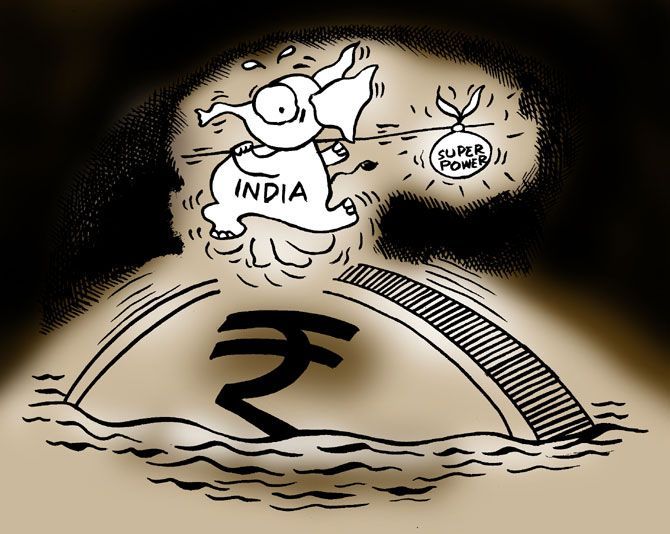 | « Back to article | Print this article |
Analysts are of the opinion that given the change in the business model, which is resulting in smaller deals spreading across the whole year, clients may be already renegotiating prices.
Illustration: Uttam Ghosh/Rediff.com

As the Indian rupee touched a record low of 71 against US dollar, domestic IT service companies face the imminent threat of clients asking them for bigger discounts, especially for contracts coming up for renewal as well as for new ones up for bidding.
While experts don't see a trend unlike previously when clients used to come back asking for pricing discounts for the existing engagements, the new contracts would see a significant competition among the IT vendors as they would look at passing on most of the benefits to the clients.
Rupee has depreciated around 3.8 per cent till date from the end of June.
It has fallen close to 11 per cent against the greenback from the beginning of this year.
As a thumb rule, every one rupee fall against the US dollar translates into a gain of around 30 basis points in the operating margins.
"We have seen a secular trend of contract prices coming down as the whole business is getting commoditised.
"With rupee depreciation, this will come under further pressure as clients will ask for downward revision," said V Balakrishnan, chairman at Exfinity Ventures and a former chief financial officer at Infosys.
Despite a sharp fall in rupee in the past year, he said, its reflection on the margins was minimal as competitions for winning new deals were forcing the IT services providers to pass on most of the benefits to clients.
For instance, while rupee had plunged more than 10 per cent in the last twelve-month period, the operating margin of Infosys has declined from 24.2 per cent by the end of September quarter in FY18 to 23.7 per cent in the first quarter of FY19.
For Tata Consultancy Services (TCS), the operating margins declined marginally from 25.1 per cent reported in Q2 of FY18 to 25 per cent in Q1 of this financial year.
Similarly, in case of Wipro, operating margins fell from 17.3 per cent in Q2FY18 to 17.2 per cent in the first quarter of the ongoing fiscal.
Analysts are of the opinion that given the change in the business model, which is resulting in smaller deals spreading across the whole year, clients may be already renegotiating prices.
"Now deal sizes are smaller with shorter tenure unlike past cases when those used to be long-term contracts.
"So, negotiations are not restricted to year-end period now," said Pareekh Jain, managing director of global research firm, HfS Research.
However, officials of IT services firms denied of any possibility of mid-term price revision with the clients.
"We don't see many cases of mid-term price negotiations due to currency.
"Where we do 'run-the-business' engagements, there is an expectation for continuous efficiency improvement.
"But, that is due to business pressure and not linked to currency," said Rostow Ravanan, chief executive officer and managing director (MD) at Mindtree.
Similarly, another mid-tier company NIIT Technologies said clients were least bothered on the movement as most contracts were dollar-dominated.
"Impact of currency on companies will depend on their hedging policy.
"I think it doesn't concern the clients a lot," said Arvind Thakur, vice chairman and MD at NIIT Technologies.
Equity analysts, however, said companies would factor in the rupee fluctuation while bidding for new deals.
"In case of new deals, companies will certainly bid taking into account the recent Rupee fluctuation.
"Clients may not have to ask for it during contract renewal or for new deals," said Madhu Babu, senior research analyst at Prabhudas Lilladher.